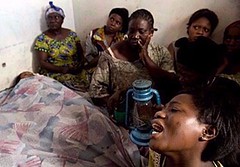
Congolese women mourning the loss of two civilians who were killed in Goma. The Congolese army units broke down in the city creating chaos that is being exploited by the rebels.
Originally uploaded by Pan-African News Wire File Photos
African leaders criticized the world's largest United Nations peacekeeping force Friday for failing to protect civilians and end the violence that is convulsing the Democratic Republic of Congo's east and threatening to spread.
U.N. Secretary-General Ban Ki-moon acknowledged the 17,000 troops were "stretched to the limit." He spoke in Nairobi at a summit with African leaders that included Congolese President Joseph Kabila and Rwandan President Paul Kagame. Officials said rebel leader Laurent Nkunda, who's spearheading the Congo offensive, was not invited.
The summit communique said regional nations should send peacemaking forces if necessary and "not stand by to witness incessant and destructive acts of violence by armed groups against innocent people."
Both sides have been accused of killing civilians. New York-based Human Rights Watch said at least 100 have died, while others say the civilian toll is undetermined.
Meanwhile, fighting raged anew in Congo between the army and rebels outside Goma near Kibati, where about 45,000 refugees from the rebellion in mineral-rich eastern Congo have taken refuge. Thousands fled toward the relative safety of Goma.
The French aid group Doctors Without Borders reported fighting in the Goma-area towns of Rutshuru and Kiwanja, where the charity tried to send staff who had to turn back. The aid group said Rutshuru hospital was full of displaced civilians.
Ban denied an earlier U.N. report that Angolan troops had joined Congolese soldiers battling rebels near Goma, an account that raised new fears the conflict could spread in the region.
Congo asked Angola for support Oct. 29, as rebels led by Nkunda, a Tutsi former general, advanced toward Goma, capital of North Kivu province near the Rwandan border.
On Friday, a U.N. official and a Uruguayan peacekeeping officer said that an unspecified number of Angolan troops arrived four days ago.
During the summit, Ban said he knew nothing about Angolan troops in Congo. "I have no information about the Angolan troops participating in this at this point."
In New York, U.N. Assistant Secretary-General for Peacekeeping Edmond Mulet suggested some people may have mistaken Congolese government troops who had trained in Angola, and therefore spoke Portuguese, for Angolan troops.
There is widespread concern that the involvement of Angolans could spread the conflict beyond Congo's borders. Congo's 1998-2002 war drew in more than half a dozen African nations.
Rebel leader Nkunda went on the offensive Aug. 28 and brought his fighters to the edge of Goma last week before declaring a unilateral cease-fire, which has since largely crumbled. Tens of thousands of civilians fled the fighting and an unknown number were killed or injured.
Meanwhile, the U.N. said late Friday that troops loyal to Nkunda's rebels had been fingered over the callous murder of civilians this week.
Following an inspection team's visit, the U.N. Mission in DR Congo, MONUC, said that "serious violations of human rights" had been confirmed in Kiwanja.
"Witnesses have described incidents during which civilians lost their lives" on Tuesday, as Mai-Mai militia fighters attempted to seize the town from Nkunda's National Congress for the Defense of the People (CNDP) forces.
The U.N. statement said it had also received "credible reports" of deaths "just after" the Mai-Mai left Kiwanja.(AP-AFP)
Beirut, Updated 08 Nov 08, 05:35
Civilian deaths in Congo are war crimes says UN
Azerbaijan News.Net
Sunday 9th November, 2008
The recent killing of civilians by armed militia in the east of the Democratic Republic of the Congo (DRC) “constitute war crimes”, the top United Nations official to the country said today, while welcoming the outcome of Saturday's high level meeting, aimed at ending the crisis.
Violent clashes between renegade-general Laurent Nkunda's CNDP rebels and pro-government PARECO/Mayi Mayi militia that broke out on Tuesday in the town of Kiwanja, in North Kivu, were condemned by the Secretary-General's Special Representative in the DRC, Alan Doss, as “serious violations of human rights and international humanitarian law.”
Mr. Doss, who is also head of the UN mission in the DRC (MONUC), called for all armed groups to withdraw from the area around Rutshuru, the scene of this week's violent outbreak, to allow MONUC to protect people in the area and enable the safe return of thousands who fled the fighting.
The clashes earlier this week continue the escalation of hostilities in North Kivu province over the last two months between Government forces (FARDC) and the CNDP headed by Mr. Nkunda, which has displaced some 252,000 Congolese, on top of the 800,000 already forced from their homes from previous fighting.
Mr. Doss applauded the statement from the UN-backed summit of African leaders in Nairobi yesterday, which urged for an immediate ceasefire in eastern DRC, and the establishment of a humanitarian corridor to ensure that the hundreds of thousands displaced can get the assistance they need.
“An immediate response can be made to the humanitarian crisis and the immediate implementation of the Joint Nairobi and Goma agreements,” Mr. Doss told reporters while stopping off in Goma on his return from the Nairobi meeting.
The Nairobi communiqué is the November 2007 agreement under which the DRC and Rwanda have agreed to work together against threats to peace and stability in the region. The Goma agreement, signed by the Government and armed groups in January, included a commitment by rebels to withdraw their troops to either disarm or join the brassage process, whereby ex-combatants from armed groups are retrained to form part of FARDC.
“The Summit also established a facilitation mechanism which will involve, ¬in addition to the Special Envoy for the Great Lakes [Olusegun Obasanjo, the former president of Nigeria], all heads of State of the region,” Mr. Doss added.
No comments:
Post a Comment